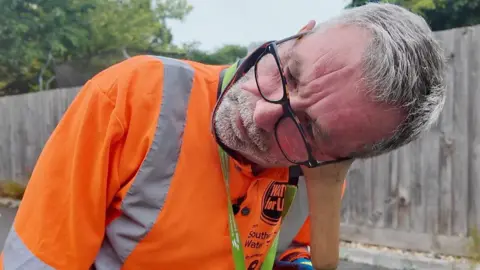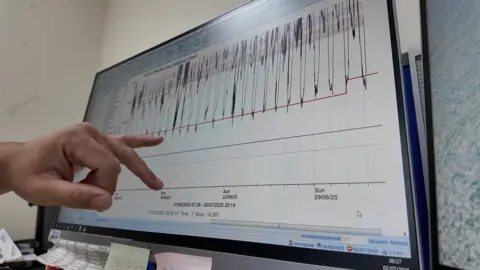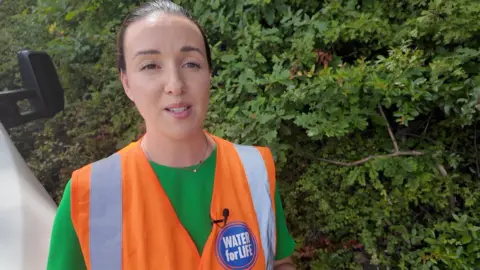Dogs and satellites - how to find a water leak
 BBC
BBCWhile water companies once again urge customers to use less, there is continued frustration from bill payers about leaks.
Southern Water supplies on average 566-million litres of drinking water every day.
But the company is losing 91-million litres daily through leakage.
It said it fixed record numbers last year but will have to nearly double its rate to hit a target set by Ofwat for 2030.
"It's a shhhhhhhh - like a shhhh noise," says leakage technician Jon Harris.
"You sort of tune in. You get used to it over the years."
He has his ear pressed against a listening stick - a long metal pole with a turned wooden end.
"If you pick up a noise on the fitting and if you go that way and it starts to go a bit quieter then you go the other way and hopefully it gets louder."
Mr Harris has been sent to investigate a suspected leak in a quiet residential close in Otterbourne, Hampshire. But there are no signs of escaping water.
Southern Water says about 90% of leaks are not visible from the surface.
Mr Harris starts lifting every stopcock cover and places his stick on to the metal fittings below. It is always his left ear he presses against the pole.
"It's tuned in," he smiles as he walks on to the next fitting. "Nothing here."

While his listening stick may seem a little primitive, the reason he has been sent is anything but.
At the company's supply works around the corner, a team of analysts are studying data from meters which constantly measure the flow of water through the system.
"We look at the night line - between 03:00 BST and 04:00 - where you find there is not a lot of usage within the network. Any increase within the night flow would normally be down to leakage," says Adam Tighe, leakage area manager for Hampshire and the Isle of Wight.
"We would analyse that data over a few nights or if there is a big spike we would react to that straight away."
For the larger and busier sections of pipes, a series of acoustic loggers listen for signs of leaks sending data back to the team in Otterbourne.
The technology cannot pinpoint the exact location but helps guide technicians to the rough area.
But that can prove a problem.

In May, traffic in Southampton ground to a halt as Southern Water searched for a leak under a main route into the city centre.
The eastbound carriageway closure of the A35 flyover led to frustration and long delays for motorists.
The road was eventually reopened after nearly a week without the leak being fixed.

"Our last resort is to dig a hole and I think there's some real learnings from the Redbridge flyover job where we've been looking at how we can use cameras in our pipes," says head of water networks, Stephanie Davidovitz.
"We are pushing cameras down there to try to locate the leak."
Last year Southern Water cut leakage by 18% but with Ofwat setting the company a target of a 32% reduction by 2030 emerging techniques and technologies are being explored.
"Finding some of those leaks is actually becoming more problematic and it's how do you get different methods in place?" said Ms Davidovitz.
"We're exploring leak detection dogs... [they] are going to be coming in a few weeks' time who are going to sniff out chlorine and therefore can help us sniff out leaks."
 Getty Images
Getty ImagesThe use of inactive fibre optic cables already in the ground next to water pipes is also an emerging technology in the industry.
Known as dark fibre leak detection, it uses a laser to detect noise at intervals along the unused fibres.
Using micro satellites to scan the ground for signs of escaping water on the surface is another potential way for water companies to react quicker.
Meanwhile, leakage technician Mr Harris has found what he has been looking for.
A tablet dissolved in the water turns the liquid pink which shows it contains chlorine and is from water pipes and not ground water.
He calculates the pipe is losing about 288 litres a day before arranging a team to fix the issue.
"They repair it and then the next day, after a night of doing the night line, they tell you that it's dropped the area - yeah it's a good feeling. Saves all that water."
You can follow BBC Hampshire & Isle of Wight on Facebook, X, or Instagram.
